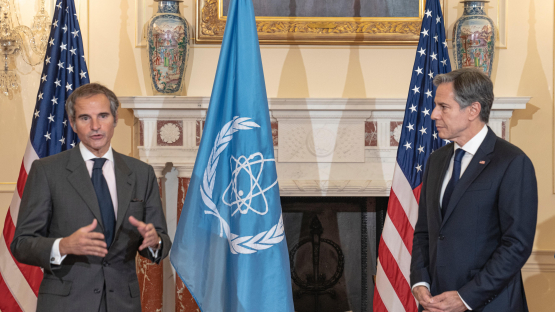Director General Rafael Mariano Grossi discussed current non-proliferation issues with Secretary of State Antony J. Blinken yesterday, at the start of a five-day visit to the United States during which he will highlight the IAEA’s growing role in fostering global peace and development.
In Washington, D.C., Director General Grossi will also meet other senior administration officials, prominent members of both houses of Congress, executives of international development agencies and leading think-tank experts.
With less than two weeks to go before the COP26 climate summit in Glasgow, the United Kingdom, he will stress the importance of nuclear energy being part of the solution to fight climate change and power the world economy in a predictable and sustainable way. He will also brief his hosts on new IAEA initiatives to step up the use of nuclear techniques to improve human health around the world.
In Monday’s meeting with Secretary Blinken at the Department of State, Mr Grossi spoke about the IAEA’s verification and monitoring under the Joint Comprehensive Plan of Action (JCPOA), the 2015 Iran nuclear agreement. With a 24/7 inspector presence in Iran, the IAEA stands ready to continue playing its role as guarantor and verifier of the JCPOA and any future agreement, he said.
They also spoke about recent developments in the nuclear programme of the Democratic People’s Republic of Korea (DPRK) – also known as North Korea, – which the IAEA continues to follow closely even though its inspectors were expelled from the country in 2009.
Mr Grossi thanked Secretary Blinken for the United States’ strong support of the IAEA’s mandate. The United States is the largest contributor to the IAEA’s regular budget. It also provides significant extra-budgetary funding, which – together with support from other Member States – has enabled the IAEA to increase its assistance the use of nuclear techniques in areas benefiting millions of people around the world, such as food security, cancer care, nutrition, animal health, water management, energy planning and others.
“Ever since President Dwight D. Eisenhower in 1953 first proposed the creation of an international atomic energy agency to promote the many peaceful uses of the atom while controlling its destructive power, the United States has consistently been a very active and generous supporter,” Mr Grossi said ahead of his second official visit to the U.S. capital since he took office in December 2019.
“As countries’ demand increasing IAEA assistance to address the warming of the planet, disease outbreaks and other critical issues, such Member State backing is more important than ever,” he added.
For example, swift and substantial contributions from the United States and many other Member States enabled the IAEA to provide technical support, including testing equipment and kits, to more than 125 countries in responding to the COVID-19 pandemic. It was the largest single technical cooperation project in the IAEA’s history. Mr Grossi has also launched new initiatives to help prevent future pandemics and combat plastic pollution.
However, with national budgets under pressure, he has also identified resource mobilization as a key priority for the IAEA, a policy initiative that includes reaching out to new partners among international financial institutions and in the private sector.
“Thanks to the unwavering support of our Member States, including the United States, we are making a very real difference in improving countless lives and livelihoods around the world,” he said. “But nuclear technology and science have the potential to play a much bigger part in global efforts to address today’s existential threats and challenges.”
Meeting with Senators, government officials
The JCPOA and the IAEA’s safeguards activities were also topics of discussion when Mr Grossi on Tuesday visited the Senate Foreign Relations Committee at the invitation of Chair Robert Menendez and ranking member James Risch. Around a dozen senators attended the meeting on Capitol Hill, asking questions and exchanging views with Mr Grossi on non-proliferation matters. He thanked them for their steadfast backing of the IAEA and its work. He also met with Senate Majority Whip Richard Durbin.
In talks with the Department of Energy and the Nuclear Regulatory Commission later in the week, Mr Grossi will discuss the future of nuclear energy as well as nuclear safety and security. The United States – the world’s largest producer of nuclear energy – will host the IAEA’s fifth ministerial conference on nuclear power in Washington, D.C. in October 2022.
“As a clean and reliable energy source, the world needs nuclear power,” Mr Grossi said. “With energy prices rising, nuclear power is attracting renewed attention from governments, experts and others.”




